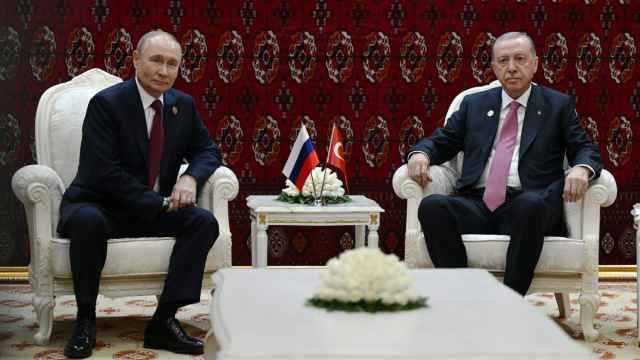An overhaul of the domestic government bond market is poised to attract tens of billions of dollars in foreign cash, as Russia seeks to make its paper accessible to heavyweight Western institutional investors.
By enabling its locally issued treasury bonds — known as OFZs — to be settled through international clearinghouses, Russia is in the process of sweeping away regulatory barriers that have kept most foreign investors away.
The liberalization means that Russia will belatedly tap into an international fashion for local currency debt, which has mushroomed in recent years as investors seek out alternatives to the low yields on dollar bonds.
"The implications are revolutionary," said Dmitry Dudkin, head of fixed income research at UralSib Capital.
The new rules could trigger an additional $30 billion to $50 billion in foreign investment in the ruble bond market by the end of 2014, Barclays Capital estimates, as foreign participation rises toward levels typically seen in other emerging markets.
"The mass of money that can shift is very large," said Christian Keller, emerging Europe research head at Barclays Capital.
"You now have an opportunity of a market that has attractive yields, good debt dynamics and has been underappreciated."
Although Russia's public finances have been transformed since it defaulted on $70 billion of domestic debt in 1998, few foreigners have subsequently braved its local bond market.
They have been deterred by cumbersome rules requiring accounts with local brokerages, as well as lengthy settlement procedures and outdated custody laws.
Of the $90 billion in OFZs outstanding, only about 4 percent are owned by foreigners — well below the shares seen in most other emerging markets, which range from about 11 percent in Brazil to more than 40 percent in Hungary.
"We have the feeling that the majority of foreign investors are way, way underweight [in] Russian local bonds because of not being able to gain exposure," said Viktor Szabo, who helps manage about $7 billion in emerging market debt at Aberdeen Asset Management in London.
Several changes this year should transform market access.
In January, Russia removed the monopoly on OFZ trading enjoyed by the MICEX exchange.
Russia has also reached a deal with Clearstream, one of the two major international eurobond clearinghouses, to settle OFZs from this month. The other major clearing system, Euroclear, is due to begin OFZ settlement in the second half of this year.
Russian legislation comes into force in July that will recognize investors, rather than local custodians, as the beneficial owners of the bonds, enabling conservative Western investors such as pension funds to buy OFZs.
Strong international demand for OFZs can also be expected because of relatively high yields, which look attractive given Russia's healthy financial position and falling inflation.
"We really like the Russian local bonds," said Werner Gey Van Pittius at Investec in London, which manages $10 billion in emerging market debt and already invests in the market through local accounts opened last year.
The ratio of Russian government debt to gross domestic product is about 10 percent, and Russia is a net international creditor once its $150 billion in fiscal reserves — held in two rainy-day funds that gather windfall energy revenues — are taken into account.
Russia plans net OFZ issuance of about $50 billion annually until at least 2014, more than doubling the size of the market.
A Message from The Moscow Times:
Dear readers,
We are facing unprecedented challenges. Russia's Prosecutor General's Office has designated The Moscow Times as an "undesirable" organization, criminalizing our work and putting our staff at risk of prosecution. This follows our earlier unjust labeling as a "foreign agent."
These actions are direct attempts to silence independent journalism in Russia. The authorities claim our work "discredits the decisions of the Russian leadership." We see things differently: we strive to provide accurate, unbiased reporting on Russia.
We, the journalists of The Moscow Times, refuse to be silenced. But to continue our work, we need your help.
Your support, no matter how small, makes a world of difference. If you can, please support us monthly starting from just $2. It's quick to set up, and every contribution makes a significant impact.
By supporting The Moscow Times, you're defending open, independent journalism in the face of repression. Thank you for standing with us.
Remind me later.





